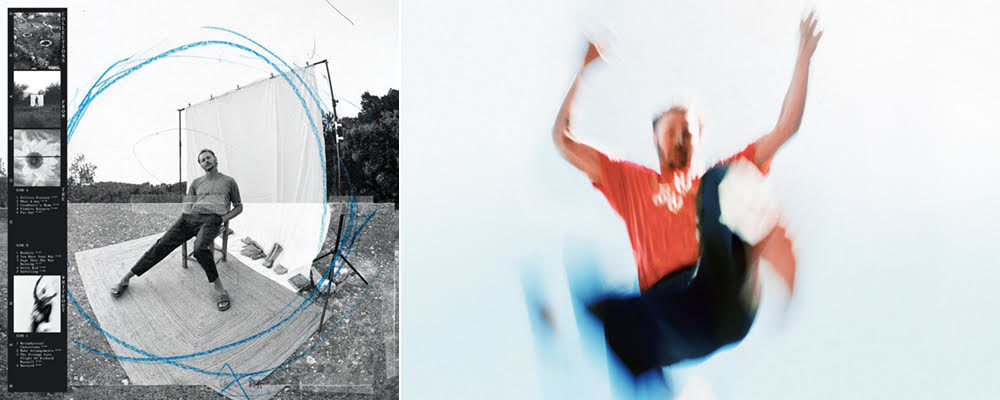Ben Howard Experiments With Indie’s Outer Edges on ‘Collections From the Whiteout’
Todd Gilchrist
English singer-songwriter Ben Howard’s “Collections from the Whiteout” was catalyzed into being after listening to “Santa Agnes,” a 17-minute ambient track by People Collective, the experimental side project of Bon Iver frontman Justin Vernon and the National’s Aaron Dessner. But much like his American counterparts, Howard usually comes from the more familiar (even conventional) musical tradition of indie folk rock than the vast experimental spaces of pioneering luminaries like Brian Eno, and that inspiration proves more subliminal on the record than truly overt. All of which is to say that “Collections from the Whiteout” mostly colors within some pretty conventional lines, navigating the space of Celtic and English folk more so than the outer limits of sonic experimentation or songwriting structure over 14 delicate, well-crafted compositions.
The first track, “Follies Fixture,” opens with a tinkling instrumental loop that guitar and dulcimer burst through like sunlight through the clouds on an English countryside, an apt metaphor as Howard indulges his cultural bona fides with geographic and literary references suitable for Charlotte Brontë or Henry James (“Walk with me to the burning spire / We can count the dead on Ender’s pyre”). A bossa nova beat percolates beneath “What A Day,” and Howard’s voice follows that tone with a reedy falsetto, describing the weather and landscape like some sort of English version of Stan Getz and Joao Gilberto’s “Girl From Ipanema” as he sings about the “sound of rivers breaking.”
“Crowhurst’s Meme” starts with an almost industrial hip-hop beat before more organic instrumentation, and finally, his voice pierces that catchy chug; “When I wake up / I’m a long way out,” he sings, conveying the sensation of a small craft on a milk sea, as Brian Eno said in 2010. Acoustic guitars conclude the song beneath an understated confession (“I’m aware of the allegory, yes it’s plain”) before his electric guitar begins to reverberate on “Finders Keepers,” a great example of his skill in juxtaposing some of those more discordant tones with evocative (if not always literal) lyrics and the naked, honest power of his voice. “What’s that in the river / That suitcase, that pearl,” he repeats, never requiring the listener to assemble his novelistic details into actual narratives but to understand, identify, even relate to the idea of some combination of words.
Howard ventures vaguely in McCartney-esque territory on “Far Out,” especially with verses like “Time to make a new plan / Said the grave digger man / How am I to make a killing /What with all of this living,” and then does a pretty convincing Nick Drake/ Donovan impression on the acoustic ballad “Rookery” (“Birch tree lost its branch one day in violent winter”). That romantic sensibility continues on “You Have Your Way,” especially when he harmonizes over tambourine and acoustic guitar, singing lyrics like, “You have your way / Of turning the air autumn around me.” “Sage That Was Burning” bounces back to the Garbage/ Bjork-like industrial loops of “Crowhurst’s Meme” with another reverb-drenched drum sample out of which a live breakbeat emerges as if liberating itself from the electronic processing. He then cycles through guitars and other instrumentation. It’s tracks like this that evidence his real gifts at merging those experimental ideas and compelling melodies, using lyrics like “Sage that she was burning / When she sang, she sang the clouds of all things / Hyacinth evening / Rattling the breeze in” to develop a deep and affecting sense of atmosphere, both sonically and emotionally.
Again, however, the effectiveness here is less a matter of innovation than successful execution; these are songs that to some extent have been constructed or performed by artists like those mentioned above, and newly distinguished by his considerable chops. “Sorry Kid” is a terrific indie rock line drive, grooving on an electronic beat over ephemeral multitrack harmonies that lead naturally into an earworm of a romantic punch line: “The movers and the shakers / They’re buying up the big lots now /What a girl to take it.” If “Unfurling” feels a bit more like a low key pub song, “Metaphysical Cantations” echoes with precisely the right level of musical psychedelia to live up to its name. And then “Make Arrangements” positions itself as a perfect song to listen to in a roll-neck sweater while coming to the rolling Irish countryside to live out some sort of Maeve Binchy fantasy.
Not to be confused with a lost chapter of Quentin Tarantino’s opus “Kill Bill,” “The Strange Last Flight of Richard Russell” finally seems to settle into the kind of Eno-esque deconstruction that initially inspired the record, with instrumentation echoing in and out of the background with a randomness that proves deceptive, especially once notes from an acoustic piano, and a few kick drums, find not just a rhythm but a slowly building momentum. It nails down the notion but not the full feeling of Eno’s work, kind of a lightweight version of “Lay My Love,” his 1990 collaboration with John Cale. But he then wraps the album with “Buzzard,” some imaginary English nursery rhyme picked out on guitar, undercutting the effects, and the intrigue, of the risk-taking that came before. Ultimately, Howard seems to have let himself off the hook as he was following a path that requires more fearlessness than he was willing to show, whether or not he possesses it; but as a collection of songs that dance at the edge of something a little more interesting than most modern indie folk, “Collections from the Whiteout” flirts with greatness without quite getting there.
“Collections from the Whiteout” releases March 26 on Apple Music.

